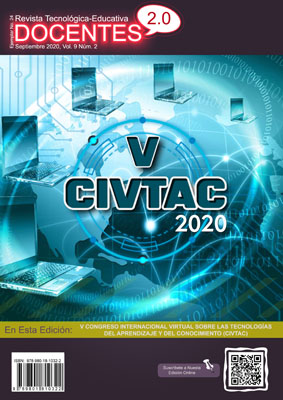Knowledge Management from a Complex and Transdisciplinary perspective at the San Francisco de Asís Private University - El Alto
 DOI:
https://doi.org/10.37843/rted.v9i2.148
DOI:
https://doi.org/10.37843/rted.v9i2.148
Main Article Content
Abstract
The dynamization of the university context from the knowledge management process in the relationship context / academic reality with the context / sociocultural reality, leads to the internal subsystems that make up the university environment can promote innovative processes that facilitate the management of resources and strategies in favor of knowledge management. The research revalues ??academic knowledge, immersed in a set of factors that activate the development of society, where processes of transformation of society are stimulated in order to prevent psychosocial risks with practical actions. involving an entire university community. The research took into account the paradigm of complex thinking, based on the case study as a research method, using the strategic position of the researcher. The involvement of an entire university community contributes to the management of knowledge that is also an articulating axis that allows a breadth of internal decision-making and subsequent continuous linkage with society, making the university a reference space Thanks to the link between the academic context / reality and the sociocultural context / reality mediated by the knowledge management process based on innovation, creativity and the promotion of participatory processes. Knowledge management must be promoted continuously by the authorities, actions that facilitate continuous, participatory and active management; managing to involve all the subsystems that make up the university, resulting in the improvement of the links and types of communication between those involved.
Downloads
Metrics
Article Details

This work is licensed under a Creative Commons Attribution-NonCommercial-NoDerivatives 4.0 International License.
Those authors who have publications in our journal accept the following terms:
- When a work is accepted for publication, the author retains rights of reproduction, distribution of his/her article for exploitation in all countries of the world in the format provided by our magazine and any other magnetic medium, optical, and digital.
- Authors will retain their copyright and guarantee the journal the right first to publish their work, which will be simultaneously subject to the Creative Commons Acknowledgment License (Attribution-NonCommercial-NoDerivatives 4.0 International (CC BY-NC-ND 4.0)). That allows third parties to copy and redistribute the material in any medium or format, under the following conditions: Acknowledgment - You must properly acknowledge authorship, provide a link to the license, and indicate if any changes have been made. You may do so in any reasonable way, but not in a way that suggests you have the licensor's endorsement or receive it for your use. NonCommercial - You may not use the material for a commercial purpose. NoDerivatives - If you remix, transform, or build from the material, you cannot broadcast the modified material. There are no additional restrictions - You cannot apply legal terms or technological measures that legally restrict you from doing what the license allows.
- Authors may adopt other non-exclusive license agreements to distribute the published version of the work (e.g., deposit it in an institutional archive or publish it in a monographic volume) provided that the initial publication in this journal is indicated.
- Authors are allowed and recommended to disseminate their work through the Internet (e.g., in institutional telematic archives, repositories, libraries, or their website), producing exciting exchanges and increasing the published work's citations.
- Request of withdrawal an article has to be done in writing by the author to the Editor, becoming effective after a written response from the Editor. For this purpose, the author or authors will send correspondence via e-mail: [email protected].
- The author will not receive financial compensation for the publication of his work.
- All Docentes 2.0 Journal publications are under the Open Journal System (OJS) platform at: https://ojs.docentes20.com/.
References
Alavi M.; Leidner, (1999) Sistemas de Gestión del conocimiento: cuestiones, retos y beneficios. España.
Andreu. R. (1999). La gestión integral del conocimiento y del aprendizaje. en Economía Industrial, núm. 326, pp. 63-72
Arroyave, D. (2013) La educación planteada desde una estrategia de pensamiento complejo: una apuesta pedagógica para re-pensar la Universidad XXI. Observaciones de Reformas Universitarias, Francia
Arroyave, D. (2013), Seminario Educación Compleja. Documento del Doctorado en Educación con enfoque en la complejidad y la Investigación Transdisciplinar. Escuela Militar de Ingeniería.
Barney, J. B. (1991). Firm resources and sustained competitive advantage. Journal of Management. (vol 27)
Devlin, K. (1999). Infosense: Turnin Information in Knowledge. NY W.H. Freeman
González, J. (2013). Aula Mente Social Pensamiento Transcomplejo. Universidad Simón Bolívar.
González, J. (2013). Currículo Transcomplejo. Universidad Simón Bolívar.
Kogut, B. & Zander, U. (1992). Knowledge of the firm: combinative capabilities, and the replication of technology. Organization Science, 3(3).
López, D. (2006). El conocimiento y la comunicación: dos pilares fundamentales de la organización de la sociedad de la información. 9(2),91-109. ISSN: 0122-8285. Recuperado de: https://www.redalyc.org/articulo.oa?id=649/64900209
Machado, A. (1998). Caminante, no hay camino. Planeta.
Morín, E. (2000). La menta bien ordenada. Ediciones Seix Barral.
Morin, E. (2003). El método V. La humanidad de la Humanidad. La identidad humana. Cátedra.
Morin, E. (2005). Epistemología de la complejidad. Recuperado de: www.pensamientocomplejo.com.
Morin, E. (1984). Ciencia con conciencia, Anthropos.
Nonaka, I. & Takeuchi, H. (1995). The Knowledge-Creating Company, Oxford University Press, ISBN 0-19- 509-269-4.
Panza, N. (2020). Docente universitario, alfarero de vidas…Revista Tecnológica-Educativa Docentes 2.0, 8(1), 60-65, https://ojs.docentes20.com/index.php/revista docentes20/article/view/106
Rodríguez, G., Gil, J.& García, E. (1996). Metodología de la investigación cualitativa. Ediciones Aljibe.
Rozo, T (2003) La construcción del conocimiento desde el hombre, la sociedad, la vida y el mundo. Universidad de Sonora.
S
otolongo, P. (2006). La revolución contemporánea del saber y la complejidad social: hacia unas ciencias sociales de nuevo tipo Buenos Aires. Consejo Latinoamericano de Ciencias Sociales.
Tobon, S. (2005). Secuelas didácticas en el contexto de la gestión educativa universitaria, Editorial Pearson.






